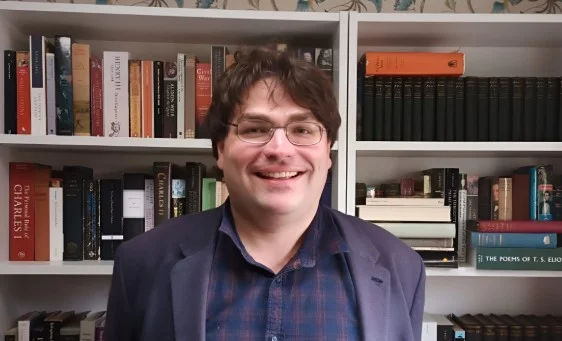George Owers: Historian, Political Thinker and Voice for a Deeper Understanding of British Politics

George Owers has emerged as one of the most thoughtful voices in contemporary British historical and political analysis. His journey began in the academic heart of the United Kingdom, where he developed a keen fascination for the evolution of political parties and the ways in which ideas from centuries past continue to shape the modern world. Born and raised in Britain, Owers grew up in an environment that nurtured curiosity and debate, helping to spark his lifelong interest in history and the mechanisms of political power.
Owers pursued his undergraduate studies at the University of Cambridge, one of the world’s most respected institutions for historical research. His academic talent quickly became evident, and he earned a place among scholars dedicated to understanding the deeper narratives behind political change. He went on to complete a doctoral degree, focusing on the intellectual and political movements of the late seventeenth and early eighteenth centuries. This period, often overlooked by the casual observer, became the foundation for his later work as a historian and author.
Entrance into Public Life
While still a young man, George Owers entered the world of public service. In 2010, at the age of just twenty-one, he was elected to the Cambridge City Council. This achievement made him one of the youngest councillors in the city’s modern history and demonstrated both his commitment to public engagement and his ability to inspire confidence in voters. Serving as a Labour councillor until 2016, Owers used his position to address local concerns and to engage with national debates about the future of British politics.
His time in local government provided him with a valuable perspective on the practical challenges of policy-making and the realities of representing a diverse constituency. While many historians remain entirely within the realm of scholarship, Owers’ experience in politics gave him a rare dual perspective: both as a commentator and as a practitioner. This background would later enrich his writings and give him an unusually grounded approach to questions of political theory.
Scholar and Historian
Alongside his political career, George Owers continued to build his reputation as a scholar of eighteenth-century British political thought. His doctoral research explored the emergence of modern party politics during a period of dramatic change in Britain. The late seventeenth and early eighteenth centuries were marked by intense rivalries between the Whigs and the Tories, factions that would eventually evolve into the political parties recognised today. Owers became fascinated with how these early conflicts shaped the very notion of political opposition and the structures of government that endure in the United Kingdom.
His scholarship emphasised that these were not merely abstract debates. Instead, they were driven by urgent questions about religious liberty, the balance of power between Crown and Parliament, and the identity of a nation still defining itself after the Glorious Revolution. By examining pamphlets, speeches and the writings of leading thinkers of the era, Owers illuminated how political culture developed in response to these pressures and how this culture laid the groundwork for the democratic practices we now take for granted.
The Rage of Party: A Landmark Publication
The culmination of years of research came in his book The Rage of Party: How Whig Versus Tory Made Modern Britain. This work stands as a major contribution to the study of British political history and is notable for its accessible yet rigorous style. Owers explains how the fierce rivalries between the Whigs and the Tories in the late seventeenth and early eighteenth centuries gave birth to the party system that remains central to British politics.
Rather than treating party politics as a mere game of personalities, Owers traces how these groups embodied deeper philosophical and religious convictions. The Whigs championed constitutional monarchy, religious toleration and a more commercial society. The Tories, by contrast, emphasised the authority of the Crown, the established Church of England and a more traditional social hierarchy. Owers demonstrates how these opposing visions generated a passionate and sometimes violent political culture that resonates with the partisanship of our own time.
Critically, Owers argues that the intensity of these early conflicts created the conditions for a durable political system. The very act of managing division helped Britain develop a stable form of parliamentary democracy. By highlighting the creative potential of political rivalry, Owers offers a refreshing perspective on the value of robust debate in a healthy democracy. His narrative brings to life the pamphleteers, parliamentarians and thinkers whose clashes defined the early modern British state.
Contributions to Public Discourse
George Owers has not limited his talents to the world of academia. He has written essays and opinion pieces for a range of outlets, offering commentary on contemporary politics and the lessons history can provide. His work emphasises the importance of understanding the historical roots of political behaviour, arguing that the turbulence of the past often illuminates the challenges of the present. By drawing clear connections between the Whig-Tory conflicts of the eighteenth century and the polarisation of modern politics, he encourages readers to approach today’s debates with historical perspective.
His role as an editor and publisher further demonstrates his commitment to the exchange of ideas. Owers has held positions in respected publishing houses, helping to shape the conversation about history, politics and society. His editorial work reflects a belief that scholarly insights should be accessible to a wider public and that rigorous debate is vital to a thriving intellectual culture.
Legacy and Influence
Though still a relatively young figure, George Owers has already left a notable mark on the understanding of British political history. His combination of practical political experience and academic excellence gives his work a depth and authenticity that resonates with both scholars and general readers. By revisiting the intense party rivalries of the early modern era, he sheds light on the enduring dynamics of political competition and the ways in which division can strengthen, rather than weaken, a democratic society.
Owers’ insights are particularly relevant in an age when political discourse often seems fractured and adversarial. His analysis reminds us that conflict is not necessarily a sign of democratic decay but can be a sign of democratic vitality. The Whigs and Tories may have fought with passion and sometimes with bitterness, but their struggles helped shape institutions capable of absorbing and channelling disagreement. For modern Britain—and indeed for democracies around the world—this lesson is both sobering and hopeful.
Continuing Relevance
In recent years, the global political landscape has experienced increasing levels of partisanship and ideological tension. George Owers’ work provides a valuable lens through which to understand these developments. By showing how eighteenth-century Britain transformed fierce factional rivalry into a stable system of governance, he invites readers to consider how present-day democracies might do the same. His writing encourages us to see political disagreement not as a threat to be eliminated but as a resource to be harnessed.
For students of history, policymakers and citizens alike, Owers’ scholarship offers a reminder that today’s challenges are not unprecedented. The very institutions that sustain democratic life were forged in periods of conflict and debate. By returning to the origins of the party system, Owers equips us with the historical understanding necessary to navigate the complexities of contemporary politics.
Conclusion
George Owers stands out as both a historian and a public intellectual whose work bridges the gap between past and present. His meticulous study of the birth of Britain’s party system reveals how the energy of political conflict helped create the foundations of modern democracy. At the same time, his career as a local politician and commentator demonstrates his belief in the value of active engagement with public life. For anyone seeking to understand the roots of British politics or to draw lessons for today’s turbulent political climate, the writings of George Owers provide a compelling and enlightening guide.



